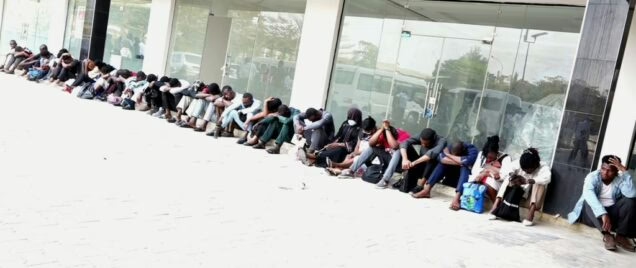BREAKING: EFCC busts Chinese-led massive internet fraud operation in Abuja
The suspects arrested in Abuja
Published By: Ayorinde Oluokun
By Ayorinde Oluokun/Abuja
Four Chinese and 101 Nigerians have been arrested by operatives of the Economic and Financial Crimes Commission, EFCC, for alleged involvement in fraudulent activities in a business apartment in the Gudu areas of Abuja, the nation’s capital.
Dele Oyewale, the spokesperson for the anti graft agency in a statement said the 105 fraud suspects were arrested in Abuja by the EFCC as part of the Commission’s bid to clean the nation of internet fraud and other acts of corruption.
According to the statement, the suspects who were arrested on Thursday, January 9, 2025 comprise 67 males (including four Chinese) and 38 females.
The statement indicated that the suspects were involved in hotel review job scam, targeting victims and hotels in Europe and other parts of the world.
The four Chinese men arrested alongside the 101 Nigerians
“The suspects will be charged to court upon conclusion of investigations,” Oyewale said in a statement.
The arrests of the over 105 Nigerians and foreigners for internet fraud followed similar landmark haul of 792 suspects for alleged involvement in cryptocurrency investment fraud and romance scam by EFCC in Lagos on Tuesday, December 10, 2024.
The suspects were arrested by operatives of the anti-graft agency in a surprise raid at their hideout, an imposing seven-storey edifice known as Big Leaf Building, on No.7, Oyin Jolayemi Street, Victoria Island, Lagos , following verifiable intelligence received by the Commission.
Those arrested as revealed in at a media briefing in Lagos on Monday, December 16, 2024, include 148 Chinese, 40 Filipinos, two Kharzartans, one Pakistani, one Indonesian were arrested during the operation.
Director, Public Affairs of EFCC, Wilson Uwujaren, who briefed journalists said foreign nationals used the facility, which could be mistaken for a corporate headquarters of a financial establishment, to train their Nigerian accomplices on how to initiate romance and investment scams and also used the identities of their Nigerian accomplices to perpetrate their criminal activities.
According to him, “All the floors are equipped with high-end desktop computers. On the 5th floor alone, investigators recovered 500 SIM cards of local telcos that were bought for criminal purposes.
- EFCC detains 10 officers over alleged theft
- EFCC in turmoil: 10 officers detained over missing items scandal
- EFCC’s 2025 book of sins
Inside the building being used for the fraudulent activities by the alleged fraudsters
“ Their Nigerian accomplices were recruited by the foreign kingpins to prospect for victims online through phishing, targeting mostly Americans, Canadians, Mexicans, and several others from European countries.
“They usually arm them with desktop computers and mobile devices and create fake profiles for them.
“The Nigerian accomplices are equally provided with logs that allow them access to foreign communication lines and victims, which they chat with on WhatsApp, Instagram and Telegram.”
While giving further details about the modus operandi of the syndicate, the EFCC Chair said the Nigerian accomplices, who are assigned WhatsApp accounts linked to foreign telephone numbers, especially from Germany and Italy, engage victims in romantic conversations as well as phantom business and investment discussions to trick them to shop on the purported online investment shopping platform called www.yooto.com.
He added: “For those who show interest, activation fees for an account on the platform starts from $35USD.
“Investigation revealed that the criterion for recruiting these young Nigerians is proficiency in the use of computers, especially typing skill. Those who passed the test are given desktop computers and mobile devices and then taken through a two-week induction on how to personate foreign females in romance scam chats and convince victims to invest in their employers’ cryptocurrency investment scam.
The building where the suspects were arrested
“Once the Nigerians are able to win the confidence of would-be victims, the foreigners would take over the actual task of defrauding the victims and proceed to block their Nigerian accomplices from the network. This would then leave them in the dark about the transaction.”
He, however, said the Nigerians involved in the alleged fraudulent activities “do not know the owners of the ‘company’ they work for because they are not offered letters of appointments or receive payment from a corporate account.”
According to him, the suspected Nigerian accomplices are usually paid either in cash or through an individual’s account.
He added that the Commission was working with its foregoing partners to establish the extent of the scam and the accomplices as well as the likelihood of any collaboration with organized international fraud cells.











